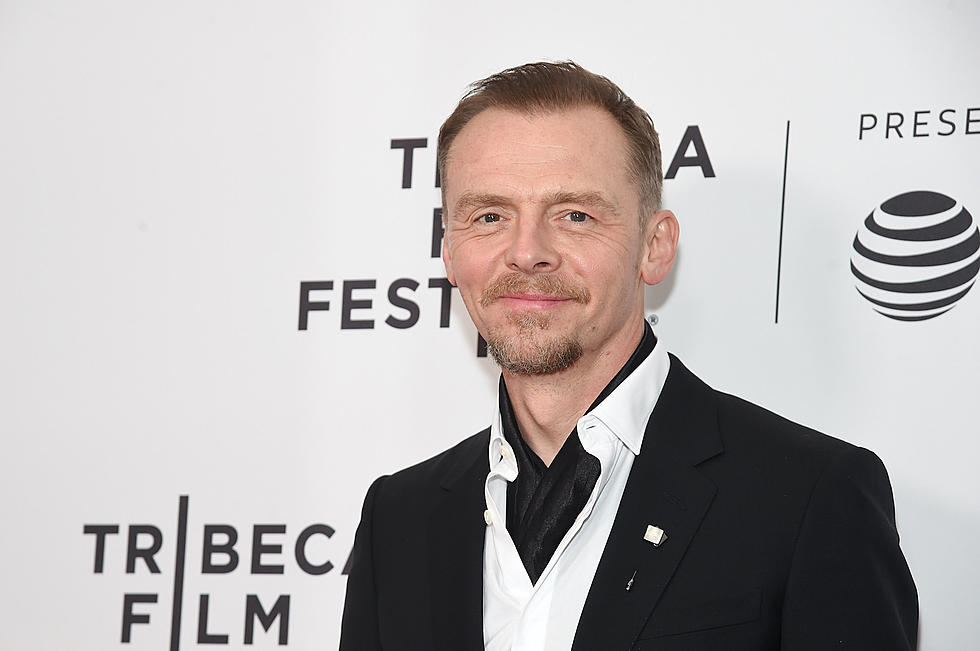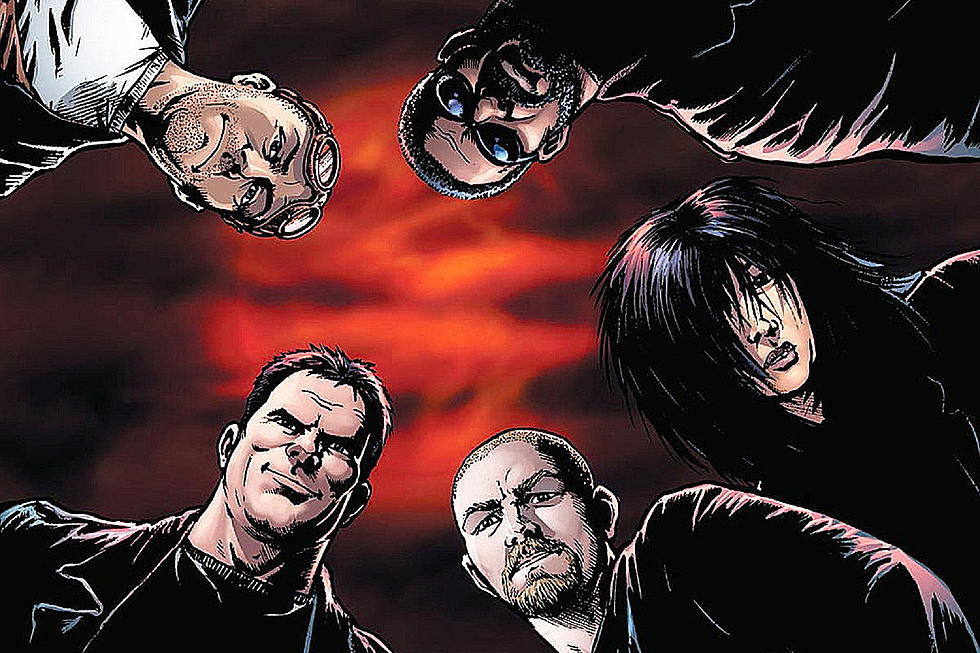
Simon Pegg and Nick Frost Interview: Growing Up, Getting Old and ‘The World’s End’
Simon Pegg and Nick Frost are serious blokes. Their new movie, 'The World's End,' acts as the finale of the informal "Cornetto" trilogy and once again partners the 'Shaun of the Dead' and 'Hot Fuzz' pair with director Edgar Wright. And while it's a comedy in the vein of those two films, it's tackling material that's significantly more mature than anything they have done before. Alcoholism, drug addiction, the deadliness of adult immaturity, all baked into the mold of a '70s sci-fi allegory — 'The World's End' walks a tightrope between poking fun and bathing in misery. The combination is exhilarating.
That's the appeal to Pegg, who co-wrote the film with Wright, and Frost, who had a great deal of say when it came to the film's evolution. In person, the duo bounce just as quickly between introspection and cracking wise as 'The World's End.' They're not in the business of cheap laughs. They make films and they're considerate of the artistic potential. Even a movie with killer robots can say something, and they're eager to say it.
I sat down with Pegg and Frost to talk 'The World's End,' why the movie has been floating around since 'Hot Fuzz' hit theaters, what they felt they owed fans years later, and why it might be awhile until we see them together again. No, there won't be anymore 'Spaced' (but they aren't afraid of speculating what happened to their TV counterparts).
There is difficult in talking to actors because most of them see their jobs as showing and doing what they're told. But you two and Edgar are collaborators on every level. So what changed after you went off, worked with lots of different people on a wide variety of projects, then reunited for a third time? Or what remained intact?
Simon Pegg: It's exactly the same setup — it needed to be, honestly, for us to call it 'the third part.'
Nick Frost: It worked.
Pegg: It's like coming home, really. The relationship I have with Edgar and Nick and Nira Park is my oldest working relationship that I have. And in many respects the first working relationship I had of any kind of significance for me. It made sense that the film was about friends reuniting — although we hadn't been apart from that time because we're all in each other's lives in that time.
Nira feels like the shadow player in your work. Less face time, but the master puppeteer.
Frost: She's the power.
Pegg: She's the George Martin of our Beatles.
Frost: I don't think I'm overstating it when I say, 'Nira gets it done.'
Pegg: She's the fixer.
She's your Michael Clayton.
Pegg: She'll break your legs.
Frost: She protects us from so much and it enables us to get on with making the film.
What is she protecting you from?
Pegg: All the shit [laughs].
Frost: Things that would worry us if we knew they were happening.
Pegg: The business of filmmaking. She's not some corporate entity but she can cope with that side of filmmaking. And it's increasingly harder to traverse. She allows us to have the space and not have to worry about budgets and shit like that.
You mention the frightening landscape of moviemaking these days, and while it seems like more original content comes of the UK than in Hollywood, I can't imagine it's much easier. I'm amazed that a genre-bending movie like 'The World's End' exists.
Pegg: So are we. Operating on the fringes that we do, outside Hollywood — because the UK is a fringe — helps us fly under the radar. One of the themes of the three films are being an individual against the collective. And we feel that way as filmmakers. We're on the edge of a very homogenizing force that could change us forever.
Frost: I would say that has to do a lot with our relationship, and Nira's relationship with Working Title. We trust each other. As long as we wrap on time and come in on budget, they don't really care what we do.
Pegg: There's, arguably, a bigger shadow figure in [Working Title producer] Eric Fellner.
Frost: Uncle Eric!
Pegg: Our ally from the big world. He likes us to do what we do.
Frost: He's our Mr. Masters.
Pegg: Nira is Higgins.
Now we can start spreading 'Magnum P.I.' remake rumors! Does it feel like 'you vs. the collective' when you write roles for yourselves? Did 'Shaun' define your types and did you intentionally use 'World's End' to break them?
Pegg: We're careful, with the exception of 'Tintin' — which was something we were desperate to do because of Steven Spielberg — we try to keep our collaborations to our own. Not appear in other peoples' films. That might not be the case in the future, I would never say never. But so far, we have the say in how we're represented.
Frost: It would be fair to say that we're very controlling people. We want to control what we do and say.
So you've heard more than a few pitches where the two of you are paired in the same ways?
Frost: 'Here's $5 million each to make the Laurel & Hardy biopic!'
Pegg: Now you're trying to make something happen.
Work the press!
Pegg: The occasions we've worked together outside our own creative unit… in the case of 'Tintin,' we were playing the exact same character because the joke is they're identical even though they aren't related. In the other one, an animation from the Laika guys called 'Boxtrolls,' we didn't even realize the other one was in it until we saw the press release. 'Hey, you're in that too!'
What kind of impact did 'Paul' have on your careers? I imagine going off and making movie together with out Edgar had major differences.
Pegg: It was interesting, wasn't it?
Frost: But it was no less rewarding. Working with Greg Motolla was an absolute treat.
Pegg: It was funny, because we obviously wrote that together without Edgar around and when it came to making the movie, Greg has a different energy than Edgar on set. We came back both changed. The experience of writing 'Paul' I fed into 'World's End.' Same with Edgar writing 'Scott Pilgrim' with Michael Bacall.
I'm glad we didn't make 'The World's End' when we had the idea. I'm glad we waited six years because I don't think we could have made it then. I didn't think we were old enough or wise enough. This film is incredibly personal. It's about reaching 40. When we started to write it I was 41 and it made sense. 'I get it now!' We were looking back ourselves at 20-year-olds and saying something about perpetual adolescence, which comes up a lot in film, particularly comedies, but it feels like the right time to talk about it.
Though this isn't about oafish man children.
Pegg: It's critical of it. A lot of these films are about getting away from your wife and family for the weekend and you get drunk and have sex with strippers. It's something to be wished for. This film says, 'Maybe it ain't?' Maybe the grass isn't greener.
Frost: There are consequences too. It doesn't return to the status quo where you get the chance to open your dream… florist [laughs].
I have heard you describe your comedy as a commentary on what people think of the UK from an outside perspective. Does that hold true for 'World's End'? If that's the case, what's the context us American folk should be aware of?
Pegg: We've never made a postcard out of the UK. What you see is really the UK. The UK you see generally in films… you see a few strings of Royal Britannia, a red bus goes by…
Frost: …and it's snowing.
Pegg: You're in England. Our films are the real England. It's the suburbs, the garden cities, the real villages.
Frost: The real occult.
Pegg: The real zombies. At the same time, we draw heavily on cultural touchstones. Pop culture in small communities.
As you mentioned, 'The World's End' has been floating around for quite awhile. I think quickly after 'Hot Fuzz,' you guys dropped a title and like that, fans were rabid for updates. By the time you decided the time was right to make the movie, did it feel like you owed the movie to fans? I imagine interacting with fans on Twitter only adds pressure.
Pegg: Yeah, but we don't pander. The people we try to satisfy are primarily ourselves. We established with 'Spaced' and 'Shaun of the Dead' that there are people like us, that have similar sensibilities. So we trust our own instincts to give them what they want instead of imagining what they want. What was fun to us is that we owed it to ourselves to make this film.
We never made a third series of 'Spaced' because time and circumstance got away from us. We've been constantly asked about it for ten years, fifteen years. That's kind of annoying.
Though they seem like the characters you could easily return to whenever you wanted. That opportunity doesn't seem appealing?
Pegg: No. I would be interested in hypothesizing. We would never get Edgar back.
You can write fan fiction on the Internet.
Frost: "Mike and Tim fucking furiously in a foxhole in Afghanistan."
Pegg: Whoooa, it was Athens!
Frost: No, Afghanistan. But you know, if you try and pander to one group of people, you dilute the thing you liked in the first place. The zeitgeist is ever-changing. If you try second guess what people want, you'll miss it.
Pegg: You have to blaze trails, not follow them.
More From ScreenCrush









